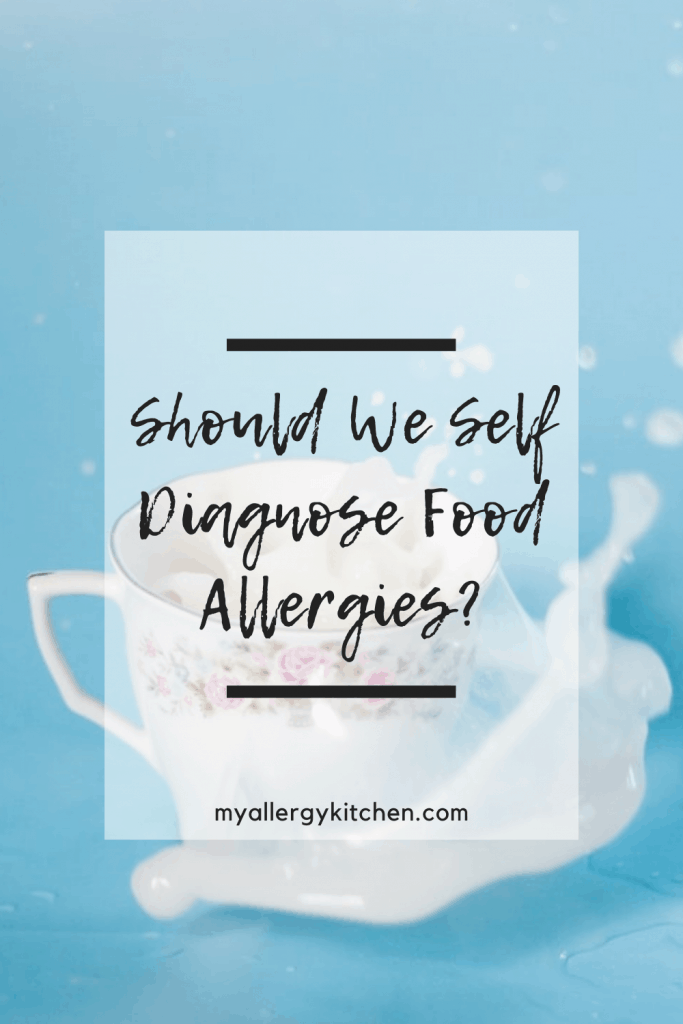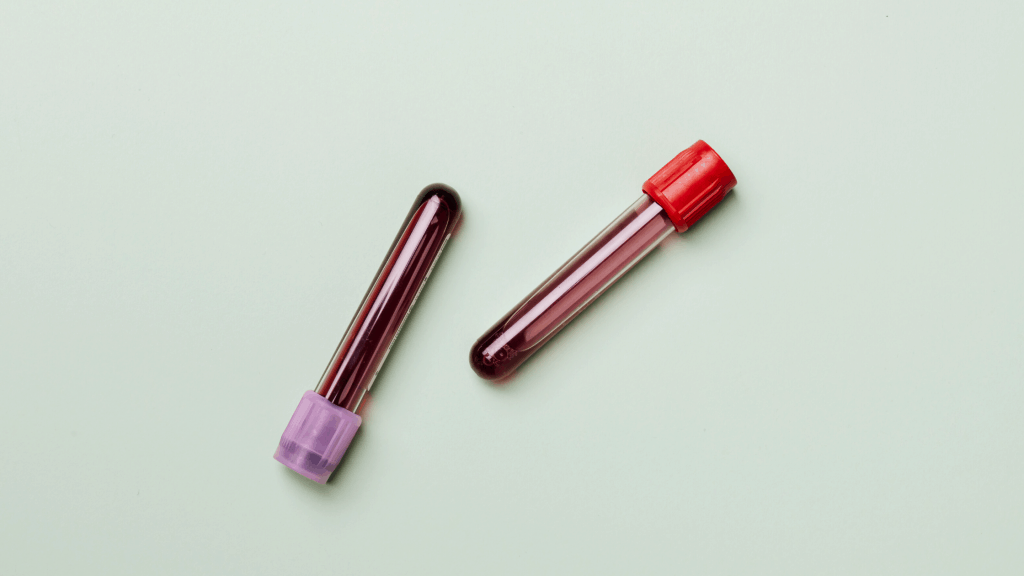Food allergies are on the rise, with an estimated 2 million people in the UK with a diganosed food allergy. Hospital admissions for allergic reactions are increasing sharply over time. Food allergies can cause unpleasant symptoms such as hives, diarrhoea, vomiting and in severe cases, anaphylaxis. The most important way to manage food allergies is strict avoidance of the foods that cause a reaction. So why are we told it is important to get medical advice and support if a food allergy is suspected? Can't we just self diagnose food allergies?
Jump to:

What is a Food Allergy?
A food allergy is an adverse immune system reaction to a food substance that is normally considered harmless, for example nuts, peanuts, milk or eggs. Note that a food allergy is not the same as a food intolerance. A food intolerance may cause similar symptoms to a mild allergic reaction, but is due to an inability to digest the food. It usually only causes digestive distress, and doesn't involve the immune system.
There are two main types of food allergy: IgE mediated and non-IgE mediated. Let's take a closer look at each of these:
IgE Mediated Food Allergy
An IgE-mediated food allergy is an immediate reaction to the food in question. This means symptoms start to appear within minutes or up to two hours of eating the food. These types of reaction can affect multiple organs within the body and you might see symptoms such as:
- swelling or itching in the face or throat
- hives (an itchy, red, raised rash on the skin)
- vomiting
- diarrhoea
A severe allergic reaction, anaphylaxis, can be life threatening. If you suspect someone is experiencing anaphylaxis you should use their adrenaline auto-injector (if they have one) and call an ambulance immediately. Symptoms of anaphylaxis include:
- difficulty breathing
- feeling dizzy or faint
- confusion or anxiety
- collapsing or losing consciousness.

Non-IgE Mediated Food Allergy
A non-IgE mediated food allergy involves delayed reactions to a food or foods. These reactions tend to appear after two hours and within three days of eating a food. Symptoms might include:
- Reflux and/or heartburn
- Vomiting
- Diarrhoea and/or constipation
- Skin rash or eczema
- Blood and/or mucus in stools
- Abdominal pains
In severe cases, non-IgE mediated food allergies in children can cause shock, dehydration, refusal to feed, and failure to thrive.

How Are Food Allergies Diagnosed?
There are two main methods for diagnosing food allergies. The first is allergy testing, and the second is by completing an exclusion diet. Let's take a look at these two options in more detail.
Allergy Testing
Allergy testing is useful for IgE-mediated food allergies, that is, immediate reactions. These tests measure the levels of IgE antibodies for specific foods in the blood. High levels of these antibodies can be an indicator of an allergy to that particular food. These tests are available from your GP surgery.
Skin prick tests are another option. These are carried out in an allergy clinic. They can help determine whether a person's allergies are getting better or worse over time.
Exclusion Diet
Exclusion diets are used for non-IgE mediated food allergies, for which there is no accurate testing available. Firstly, a person excludes a food or foods that they think they may be allergic to. They monitor symptoms over a few weeks to see if they improve. Then, they reintroduce each food one at a time and see if the symptoms return.
Why Self Diagnose Food Allergies?
Over half of the UK say that Covid-19 has made them more likely to try and diagnose their own symptoms before consulting a healthcare professional, a YouGov online study conducted on behalf of Thermo Fisher Scientific Inc, has found.
The new analysis, based on a survey of more that 2,000 UK adults aged 18+, shows that many are still reluctant to go straight to visit their GP when symptoms of an illness or health condition appear and will instead try to manage their condition alone first.
52% say that the pandemic has made them more likely to try and diagnose their own symptoms if feeling unwell, before consulting a GP. The survey also showed that since the beginning of the lockdown 39% are reluctant to visit their GP at this time because they didn’t want to waste their GP’s time. A quarter of respondents (25%) stated that they didn’t want to visit their GP because they were worried about catching Covid-19.
Avoiding the GP surgery has serious implications for many health conditions including allergy, where the UK has some of the highest prevalence rates in the world.

Allergy Is Not A Minor Health Condition
Affecting over 20% of the UK population, allergy can prove fatal without an accurate diagnosis. Despite this, more than a third (37%) of those surveyed said they considered allergies to be a ‘minor health condition’. Almost half (47%) incorrectly agreed that allergy was simply a more severe type of intolerance.
When asked in which ways, out of a list, they would respond if they or a family member developed symptoms of an allergy or intolerance, 59% said that they would search online for information and 56% would buy over the counter medication, such as antihistamines. 26% would consult a family and/or friend, only 10% would contact a patient charity (e.g. Asthma UK etc.) and 8% would buy a home testing kit online.
Amena Warner, Head of Clinical Services at Allergy UK, says, “We need to take allergy seriously and stop treating allergy and allergic asthma as ‘minor’ health conditions. Attempting to manage these kinds of conditions alone, without accurate diagnosis, can be dangerous.”
In the 20 years leading up to 2012, there was a 615% increase in the rate of hospital admissions for anaphylaxis in the UK. Today, a staggering 44% of British adults suffer from at least one allergy and the number continues to rise.[1]
Get Tested At The GP Surgery
The most accurate way to discover a person’s allergy triggers, and potentially save lives, is through specific IgE testing*. Accurate testing is available through GP surgeries, yet almost two thirds (63%) stated they were not aware that this was the case. 80% of those surveyed, however, said that Covid-19 had made them aware that testing in order to track and trace diseases was important.
Warner continues, “Always speak to your doctor first and discuss options for getting a specific IgE test for what may be triggering your allergic symptoms and avoid trying to source online or unvalidated tests.”

Should We Self Diagnose Food Allergies?
You should always seek medical advice if you suspect you have a food allergy. At the very least, if you self diagnose food allergies, this may mean that you avoid foods unnecessarily. This can lead to nutritional deficiencies, having a long term health impact. At worst, you could end up in an emergency situation and rushing to hospital.
Allergies are very individual and so you can't rely on online information alone. You must get advice from a health professional if you think you have had an allergic reaction.
*IgE tests, or immunoglobulin E tests, measure the levels of IgE, a type of antibody. Antibodies are made by the immune system to protect the body from bacteria, viruses and allergens. IgE antibodies are normally found in small amounts in the blood, but higher amounts can be a sign that the body overreacts to allergens. This can lead to allergic reaction. IgE testing is the most accurate and conclusive method to find out if you have an allergy.


[…] every year, severe allergic reactions to food result in 90,000 visits to the ER. Some of the most common allergens are found in food, pollen, mold, and dust mite allergies though the wide range that exists is astounding. Below are […]